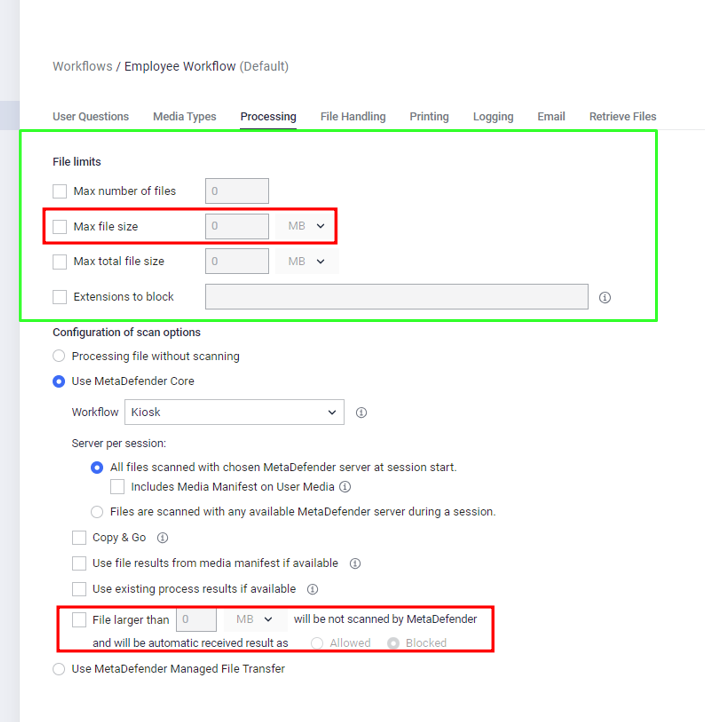Knowledge Base
v4.8.0
Search this version
Knowledge Base
Knowledge Base
Configuration & Setup
Error & Troubleshooting
Title
Message
Create new category
What is the title of your new category?
Edit page index title
What is the title of the page index?
Edit category
What is the new title of your category?
Edit link
What is the new title and URL of your link?
What is the difference between "File Larger Than" and "Max File Size Limit" in MetaDefender Kiosk?
Copy Markdown
Open in ChatGPT
Open in Claude
This article applies to MetaDefender Kiosk of all versions.
In MetaDefender Kiosk, there are two independent file size settings users can configure based on each use case. While they may seem similar, each serves a different function. Users can use them separately or combine them to meet workflow and security needs.

- "File Larger Than" Rule
This setting defines what happens to files above a certain size.
- Purpose: Automatically allow or block files larger than a specified size (e.g., 500MB), without waiting for a scan result.
- Effect: The rule applies after the file is selected in the Kiosk UI. It does not restrict file selection.
- "Max File Size Limit"
This setting restricts what files users can choose in the Kiosk UI.
- Purpose: Prevent users from selecting files larger than the defined size (e.g., 1GB).
- Effect: Files that exceed this size cannot be selected. A warning will be displayed on the Kiosk screen.
Using Both Rules Together – Examples:
Scenario 1
- Max Limit: 1GB
- File Larger Than: 500MB → Allowed
- Outcome: Files smaller than 1GB can be selected. Files larger than 500MB are automatically allowed. Files smaller than 500MB are scanned by MD Core.
Scenario 2
- Max Limit: 500MB
- File Larger Than: 1GB → Blocked/Allowed
- Outcome: Only files smaller than 500MB can be selected. The "File Larger Than" rule has no effect because larger files cannot be chosen.
Scenario 3
- Max Limit: 1GB
- File Larger Than: 500MB → Blocked
- Outcome: Files smaller than 1GB can be selected. Files larger than 500MB are automatically blocked. Smaller files proceed to scanning. This allows admins to distinguish between files blocked due to policy vs. scanning.
Summary
- "File Larger Than" = Post-selection rule that auto-allows/blocks based on file size.
- "Max File Size Limit" = Pre-selection restriction in the Kiosk UI.
If Further Assistance is required, please proceed to log a support case or chatting with our support engineer.
Type to search, ESC to discard
Type to search, ESC to discard
Type to search, ESC to discard
Last updated on
Was this page helpful?
Discard Changes
Do you want to discard your current changes and overwrite with the template?
Archive Synced Block
Message
Create new Template
What is this template's title?
Delete Template
Message

